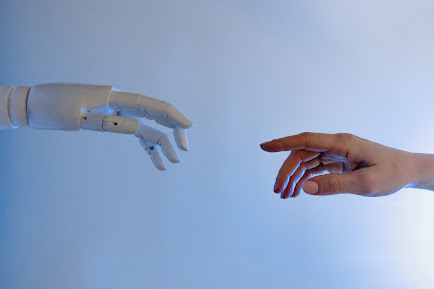 |
| Source: Inspirit AI |
A Guest Blog from Inspirit AI, originally published on the Inspirit AI Blog.
What is Artificial Intelligence (or “AI”) exactly?
Many people don’t really have a good understanding of what exactly artificial intelligence is, so here’s a quick breakdown. Artificial Intelligence is the process of using machine learning with accurate data analysis to solve a problem. Some might think that AI is just restricted to geeky guys who like numbers and computers, or that AI is figuring out systems and algorithms.
However, these assumptions are wrong. AI is starting to become the norm of technology, and will also make a giant impact towards the future.
Why learn AI?
Whether you’re a student or not, and do or do not have an interest in technology, I recommend that you should learn AI for the following reasons:
1. AI is the future of technology and will be incorporated into our everyday lifestyle
You might not think that AI is implicated in your life now, but you are wrong. Most likely, you have a device or machine that is using AI right now without you knowing it! For example, you might have the latest iPhone, which uses face recognition to unlock the phone. This process of scanning and analyzing a user’s face is done through artificial intelligence.
Likewise, automakers like Tesla incorporate self-driving functions which are based in AI learning algorithms. To no surprise, these functions also use AI in order to observe and learn patterns, and perform specific actions based on what’s happening. Although these AI processes might seem innocuous, these will become the norm in the future. The possibilities of how AI will be utilized are endless, and its impact in the future will be tremendous.
2. Learn AI to combine it with other interests & passions
The usefulness of AI can be applied to any industry, such as the fashion industry and farming industry, among others. How each industry could incorporate AI is endless.
For example, if you like designing styles for clothes, AI could potentially help. You could use data of popular trends and styles, and then generate new designs based on what patterns and trends the AI learned. By using AI, you essentially are able to come up with new designs for shoes, clothing, and much more. AI is not just restricted to analyzing and creating images, but also predicting outcomes.
For the farming industry, AI can be used to compute multiple variables such as the crop health, the soil health, or the amount of fertilizer to use. It can help predict what the harvest would be, and also estimate what variables are steady and what variables need to be adjusted. There are so many uses for AI in any field of interest.
 |
| Source: www.pexels.com |
3. Learning AI leads to many opportunities in college and jobs
With AI having the ability to be useful and versatile in many areas, this creates more opportunities in colleges and jobs. Since AI is becoming more and more important and impactful in industries, jobs surrounding this field are becoming more prevalent. Thus, learning AI in school or college, even if it’s only an interest rather than a career, can be useful for marketing new skills.
4. Learning AI will stay in your brain longer than the stuff you learn at school
Learning AI is not something you will learn quickly. It requires time to learn the programming language, and then apply it to the problem. The stuff we learn in school, such as the history of ancient civilizations, or how to interpret themes of a book aren’t going to stay in our brain. This is because there is no use for them in your future (unless you become a History or English teacher).
With AI however, you need to know how it works in order to use it. It’s the same process over and over when you work on a project, so you need to know how AI works and the process behind it. Likewise, with AI becoming more relevant to the future of technology, it means that more people will need to know programming skills.
5. You can learn artificial intelligence to improve your computer science & programming skills
Whether you have little knowledge of programming and computer science, or know multiple languages of code, learning AI also enables you to understand and advance your skills. With technology becoming more and more significant in the years to come, so will the skills of programming and computer science. Thus, programming will be beneficial in your journey through AI.
In my opinion, I definitely found it more fun to learn how to code and program stuff than learning about the history of ancient civilizations, or writing three-page long essays. You don’t need to know everything about programming and computer science, but at least trying it and even understanding it will help you in the future.
 |
| Source: Inspirit AI |
6. AI is more than just systems and algorithm–it’s also problem solving and understanding limitations
AI is an intricate system of algorithms, systems, and networks right? Although AI does include those in the making, there are many other variables that need to be taken into consideration. Such variables include problem solving, the design process, and understanding limitations. These variables also take place in the real world. For example, in AI, you need to figure out what the problem exactly is and how you will approach it.
Let’s say you need an AI to identify emotions and expressions of a user’s face. How exactly will you approach this? This can relate back to how you interpret someone else’s emotion just by looking at them and understanding body language. The design process is another thing that is important not only for AI, but also for creating anything in general. Last but not least, understanding constraints and restrictions of AI are key factors needed to make an AI work.
Let’s say someone is making an AI to look at a camera feed and images of people driving, and this AI is supposed to detect when a driver is distracted or attentive. Some problems might be the angle of the camera, the lighting, how good the quality of the camera is, and much more. Just like any problem in the real world, there will be limitations, and problems that need to be addressed to come up with a solution. So implementing AI will help improve your design process skills and understanding of problem solving and constraints.
7. You can use AI to make an impact within your community and the public
AI can be very impactful to not only you or a company, but also to the public. Take facial recognition, self driving cars, deep fakes, robotic limbs, or even computer generated pictures of people or objects. All of these had an impact, whether positive or negative, on how we look at technology and advancements. By learning and utilizing AI, you could potentially make an impact in your community, and even be recognized for your creativeness and be an influencer.
Such influencers consist of Andrew Ng (Head of Google Brain and a Professor at Stanford), Cassie Kozyrkov (Google Cloud’s Chief Decision Scientist) and Vladimir Naumovich Vapnik (main developer of the Vapnik-Chervonenkis Theory of Statistical Learning). All of these influencers have had significant impacts on technology advancements, and so could you!
AI is not limited to only specific people, jobs, or interests. It’s something anyone can utilize and learn, and incorporate into their daily life, hobbies, and career. The variety of uses for AI allow it to be used by anyone in almost any scenario. This is why AI is becoming so significant in technology. AI will be impacting our lives almost every second in the future, so being a part of this new era and even contributing to it will help make our world better.
MORE ABOUT...
At Inspirit AI, AI Scholars inspires curious high school students globally by exposing them to the defining technology of our times: Artificial Intelligence. AI is already present everywhere: in our voice-activated devices, smartphone face recognition systems, and autonomous vehicles. The potential to apply this technology for good is limitless.




No comments:
Post a Comment